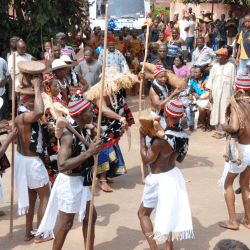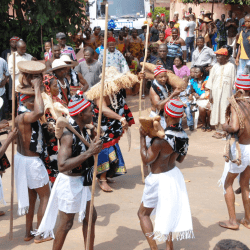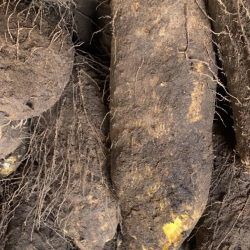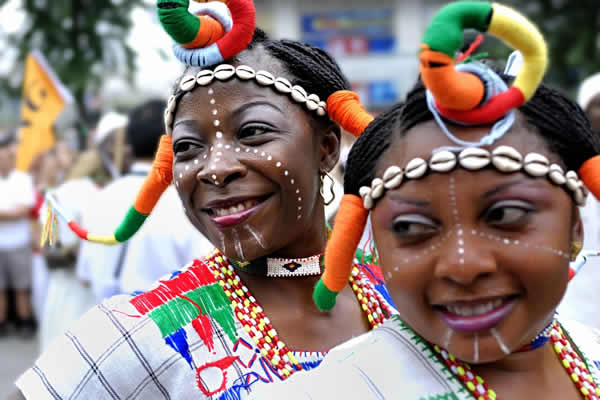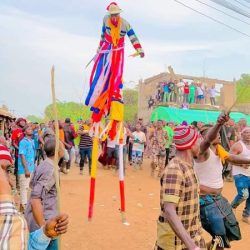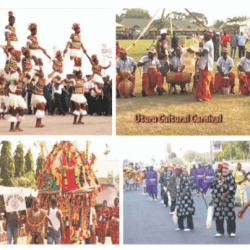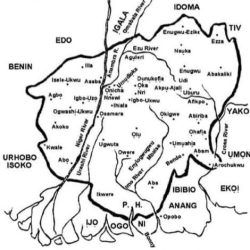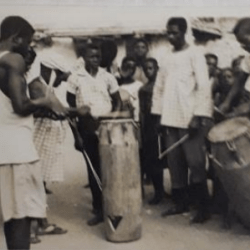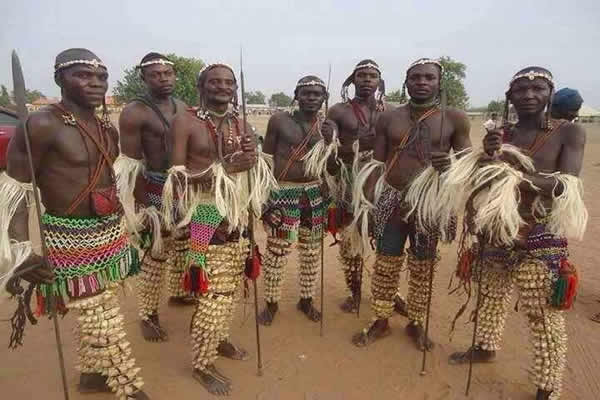Yam is an important crop in Igbo land.
Igbo people are agrarian by nature and so yam is an important element of their culture.

In Igbo mythology, the yam deity is a goddess called Ahia Njoku. Njoku is represented by the yam barns, with an effigy and a shrine.
The New Yam Festival, Iwaji is done in honor of Ahiajoku (Ajoku, Njoku, Ajokwuji). The word, Iwaji/Iriji means eating yam. The new yam signifies the fruitful end to a work year and the beginning of a new one.
The practice was said to have begun at the Arochukwu community and as time went by, the practice spread around to other Igbo communities.

In some places, the festival lasts a whole day while in others, the festival extends up until a week.
The festival is a celebration of the importance of yam in the socio-cultural lives of the people of the community.
It was described as the crowning ceremony of the year. The new yam is evidence of a good life with accomplishments.
Every year, the date of the festival is selected by the Igwe or the priest after consultation with the gods.
The period leading up until the festival is used to ostracize criminals and other things that may provoke the gods. Different communities had their practices. Among Ikwerre Ibos, the festival is preceded with a 24 day period where fighting or quarreling is tabooed or else it would anger the gods.
In Ibolo, the biggest yam in the village is kept aside to be eaten the following year. Children are specially prepared for the festival with a ritual body wash called imacha ahu iri ji mmiri. It was believed that a new year deserved a clean body. The ritual involved plants such as fresh grass, ogirishi leaves (newbouldia laevis), omu (young palm tendril).
Across communities, eating new yam before the festival was a great offense to Ala. A day to Iwaji, all old yams are eaten because it is a tradition to begin the new year with fresh yams. New yams were peculiar to their place of harvest. If a new yam came into a community from a different one, a cleansing ritual would ensue.
Early harvested yam contains traces of poison and so the waiting period gives the yam time to mature. It is why at the beginning of the festival, the Igwe or the Chief priest takes the first bite of the new yam.
This ritual is called drinking poison. After breaking kola nuts, he eats a slice of roasted yam with red oil before offering it to the gods. The Igwe thanks the gods for a successful work year and provision in time of need.
The yams were special. They may have been planted on a particular plot reserved for the purpose of Iwaji. After the rites are performed, the villages were free to eat the new yams. The farmers made sacrifices to Njoku to bless the new farming season. Every householder presents four or eight new yams.
After praying over it, the householder is to cut off small parts of the yams at the ends. This symbolizes the sacrifice of Ahiajoku. The yams are cooked with palm oil and chicken which symbolizes the body and blood of Ahiajoku.
In some communities, the new yam is passed down the social scale — from adults to teenagers than children. The prominent meals of the day were yam porridge and Roasted yam slices with red oil. The festival features the different kinds of dance troupes including the Royal Dance, Igba-Eze Dance, Cultural Dance, Masquerade Parade & Dance. Music is also performed at the festival. The women and the men parade their traditional outfits. The festival was so important to Igbo people that people named their children Njoku, Nwanjoku or Mmaji, which means the beauty of yams or Nwaji, child of yams.
It was also a season of sexual activities. It was believed that sexual energy prevailed during the festive seasons. In older journals of Nigerian pre-colonial life, this sexual energy was also identified in Yoruba culture. The Yoruba new yam festival was held to celebrate Oko, the Orisha of agriculture. Oko is also the god of sex.
The festival is usually a shameless show of sexuality and gender identity. In Ìkẹ́rẹ́ Èkìtì, it is called ÌJẸṢU festival. In Ilẹ̀ Olújìí, it is called Owe festival. The new yam ceremony cuts across cultures in Nigeria and all over the world. It is celebrated among the Ogidi people of Kogi state and Weppa Wanno people of Edo state.
With decades of European culture looming above our heads, this festival has been reduced to a whisper in Nigerian culture today. Attempts have been made to revive the practice.
In August, we were at the Urban Yam Fest because we believe that people need to connect with their roots to own their future. We hope that more age-old practices which celebrated our culture are revived so that we can create a future where we, as Africans are centered in our stories.
